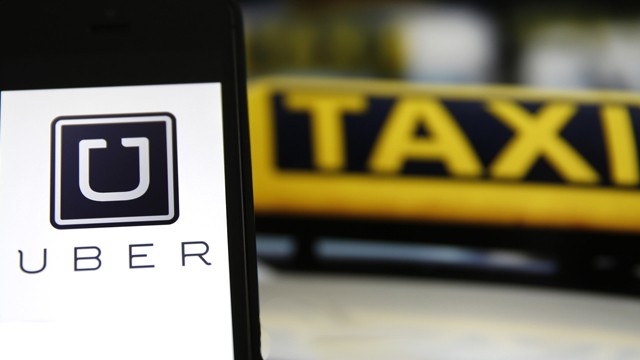The Penalties For Being an Uber Driver in Mississauga
Published April 1, 2016 at 8:05 pm

A few weeks back, we reported that Mississauga was in line to be the first city to formally regulate popular ride sharing service Uber. Shortly after, we learned that the city had asked the company to suspend operations while they hammered out some official policies for the service to abide by.
The call wasn’t welcome, but it wasn’t terribly unexpected. It also wasn’t a huge blow to the service, as it’s steadfastly continued to operate outside city bylaws in Mississauga and Toronto for some time with few repercussions. It’s also a service that legislators understand the value of. Back in February, Mayor Bonnie Crombie even told the Toronto Star, “I have always maintained that we have to strike a balance between new technologies and an established industry that has a long history of providing quality service. It is important that we create a level playing field that allows for growth and progress within the industry, while protecting public safety.”
According to a Mississauga News article, the city couldn’t quite articulate how, exactly, it was going to enforce what was, in essence, a temporary ban. When the city was asked how it would go about combating Uber, the Mississauga’s enforcement division simply said, “If there are instances of bylaw infractions, there is a process to report them,” as reported by The News.
Since Uber came onto the scene, it has managed to flout city bylaws that require drivers to have the appropriate licenses, insurance and vehicle inspections necessary to ferry the public around for a fee. Municipal governments (and traditional taxi drivers) have argued that Uber is basically a taxi brokerage service that must abide by the same bylaws that govern traditional cabs. Uber has argued that it’s simply a technology company that facilitates connections between riders and drivers using an online app. While they haven’t made their way into every city, their push into the GTA has been successful. They have clout with politicians because they’ve proven themselves to be, bylaw violations aside, a valuable and popular service that the public not only utilizes and enjoys, but defends.
When council voted to ask that the ride sharing service halt operations in Mississauga, The News reported that the city’s enforcement division said that no additional staff had been hired to enforce the official request. They also said that the current penalties in place would not change.
We reached out to the city to ask how about they’re enforcing the ban and confirmed that there are indeed penalties for driving for Uber.
“I spoke with our enforcement staff, and they informed me that if a driver/ owner is found to be operating for Uber in Mississauga, charges are laid in accordance with the Public Vehicle Licensing Bylaw 420-04, as amended,” said Carley Smith DeBenedictis, a senior communications officer with the City of Mississauga, in an email.
“Under the Penalty provisions of the bylaw any individual found guilty of an offence under this bylaw may be subject to a maximum fine of $25,000.00 and a corporation may be subject to a maximum fine of $50,000.00.”
The city has laid over 200 charges against Uber since it entered Mississauga in 2013. Although the charges are before the courts, it hasn’t stopped the city’s 5,000 drivers and over 100,000 passengers from using the service.
A staff report that lays out some options for dealing with the growing number of ride-sharing companies in Mississauga is being evaluated by the public vehicle advisory committee and a final decision should come to council this month. And not only is Mississauga hoping to resolve this issue in April, Toronto is drafting new regulations as well.
It appears that Uber is hopeful that new regulations will work in their favor. If they do — and even if they’re imperfect — they could silence (to a point) the protesting taxi cab industry and free drivers from the threat (however remote) of fines. Perhaps a landmark decision in Toronto (or Mississauga) could compel other cities to welcome the controversial but wildly popular service. Seeing a big city set a precedent could, ideally, inspire other municipalities to draft Uber-friendly legislation.
That said, it’s impossible to tell what will happen and Uber might not be totally out of the woods.
According to a recent article in The Globe and Mail, Uber will no longer be able to argue that the current bylaws don’t apply to them should regulations concerning their specific operation be passed. The article mentions the case of Calgary — a city where regulations that Uber found onerous were passed, prompting the company to pull out entirely. That said, legislation worked well for the company in Edmonton.
In the GTA, people have taken to the service in a profound way. While some prefer to use traditional taxis until thorny issues regarding driver background checks, insurance and inspections are resolved, Uber has attracted a loyal herd of regular users. Despite its cushioning of customer support, the company knows there could be a lot at stake and are embarking on a public relations campaign.
According to a recent article in The Star, Uber launched a public petition as part of its campaign that asks Toronto residents to urge city councillors to support “smart” and “progressive” ride-sharing regulations.
While there doesn’t appear to be a petition specifically for Mississauga at this time, the message Uber is sending its GTA riders is clear: we’re counting on you to help ensure the regulations are tenable to us.
With so many people valuing the ride-sharing service, embattled though it’s been, it wouldn’t be surprising to see people go equally as hard for company they value.
insauga's Editorial Standards and Policies advertising





